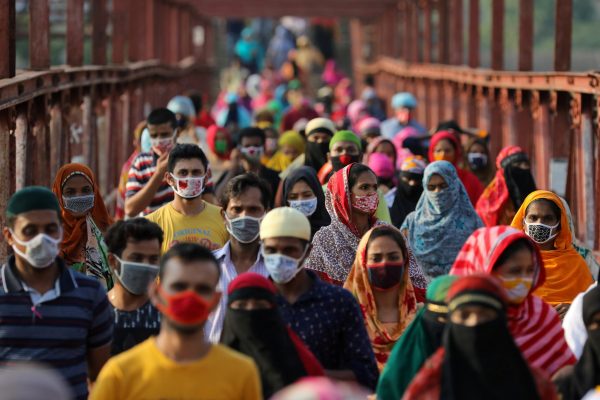Remittance flows grew by 20.1 per cent in the first eight months of FY2020 but both exports and imports registered negative growth. Private sector credit growth declined to 9.2 per cent in January and remained lower than the 14.8 per cent target for FY2020 set by the central bank. This corresponds with low private investment, which has stagnated at 23 per cent of GDP for the last few years.
Foreign direct investment (FDI) has not shown significant grown either. During the first seven months of FY2020, FDI increased by only four per cent compared to fiscal year 2019 (FY2019).
This situation is coupled with weak macroeconomic management. Between July and February of FY2020, actual spending under the Annual Development Programme (ADP) was only 38.5 per cent of the planned allocation. And in FY2019, Bangladesh’s revenue–GDP ratio was only 9.9 per cent — much lower than the target of 15.1 per cent set out in the country’s Seventh Five Year Plan.
Revenue collection was so low during the first six months of FY2020 that it will need to grow by 87.5 per cent in the second half of the year to meet the annual target — a task that seems impossible given current circumstances.
COVID-19 will further slow economic growth. Bangladesh is unlikely to achieve its targeted growth of 8.2 per cent in FY2020. The World Bank has projected growth of 2 to 3 per cent, while the International Monetary Fund has projected a rate of 2 per cent.
The economy is being affected due to both domestic disruptions and as a result of Bangladesh’s interconnectedness with the global economy. At the domestic level, uncertainty will cause private investment to decline further, impacting employment. The Asian Development Bank has estimated that if the outbreak lasts for at least six months, Bangladesh will lose nearly 900,000 jobs due to a global economic downturn. Then there are the disruptions in production and supply chains. Prices have gone up because of supply shocks. With less employment and lower incomes, the economy is also experiencing depressed demand.
Bangladesh’s export income will shrink as overall global demand decreases. But its imports are also being hampered — Bangladesh imports many raw materials such as textiles, pharmaceuticals and leather from China for domestic production.
Foreign investment will also remain subdued. Remittance earnings will decline as economic slowdown causes job cuts in destination countries. The flow of official development assistance is now uncertain, which will hamper the implementation of Bangladesh’s ADP.
The Bangladesh government has announced a stimulus package for various sectors equivalent to Tk 964 billion (US$11.43 billion), or 3.3 per cent of Bangladesh’s GDP. This support is mainly for export-oriented industries, small, medium and large industries, the agriculture sector, pandemic preparations, health workers and social safety net programs. The government has also announced it will expand existing transfer programs that benefit vulnerable households and committed to subsidising the cost of food.
Other monetary policies include delaying repayments for non-performing loans by six months, extending the time for paying the bill of entry on import-related letters of credit and lowering policy rates. The central bank has lowered the repo rate by 0.5 per cent and the Cash Reserve Requirement by 1.5 per cent to create additional liquidity.
While these measures are noteworthy, more than 80 per cent of this package is liquidity support which will be disbursed through banks. Affected businesses will be provided with working capital to continue their operations. The government then provides an interest subsidy to those loans. But the banking sector is already suffering from various challenges including high non-performing loans, low profitability, weak management and influence by politically-connected people. There are concerns that new loan opportunities will create additional burdens on the banking sector.
The other worry is about people’s livelihoods, particularly those in the informal sector. While the country has been in lockdown since 26 March, informal sector workers — who comprise around 85 per cent of the total workforce — are in dire need of income and food. Preliminary research shows that the daily income of poor people dropped by 76 per cent in the first week of April 2020.
The country is also preparing its national budget for the next fiscal year, to be announced in June. This year, the budget deficit may be higher than the usual 5 per cent of GDP because more fiscal space needs to be created to tackle the impact of COVID-19. Budgetary measures should aim to both stimulate domestic demand and strengthen supply chains through expansionary fiscal and monetary policies. The efficacy of these policies will depend on how well they are managed and coordinated by various government departments and how efficiently resources are distributed among affected people.
Given resource constraints and the pressure on the economy, the prioritisation of government spending will be much more critical this year. Some activities may wait for a few months, while others cannot. For example, immediate healthcare and health management-related expenditures must be made to save lives. There should also be cash in the hands of the poor and support for producers to strengthen supply chains.
While the government has to take these short-term measures promptly, it must also begin designing medium- and long-term measures — for example, investing in the long neglected health sector. One thing that is clear to all countries is that while confronting the immediate fallout from COVID-19 seems daunting, the aftermath will be even more challenging.
Fahmida Khatun is Executive Director at the Centre for Policy Dialogue, Dhaka.
This article is part of an EAF special feature series on the novel coronavirus crisis and its impact.

